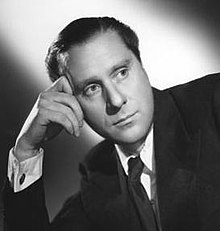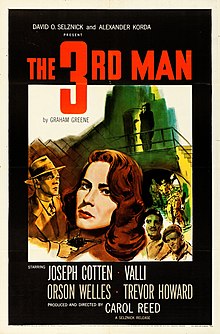不朽的電影 (1):“The Third Man,” 1949, directed by Carol Reed (1906 – 76), written by Graham Greene. 腳本、配樂、版權 https://www.facebook.com/hanching.chung/videos/4356767984333975
Carol Reed | |
|---|---|
 | |
| Born | 30 December 1906 |
| Died | 25 April 1976 (aged 69) Chelsea, London, England |
| Occupation | Film director and producer |
| Years active | 1935–1972 |
| Spouse(s) | |
| Children | 1 |
Sir Carol Reed (30 December 1906 – 25 April 1976) was an English film director best known for Odd Man Out (1947), The Fallen Idol (1948), The Third Man (1949), and Oliver! (1968).[1] For Oliver!, he received the Academy Award for Best Director.
Sir Carol Reed, the British movie director whose most famous films included “The Third Man,” “Odd Man Out” and “The Fallen Idol,” died of a heart attack Sunday night in his London home. He was 69 years old.
Sir Carol, whose work was characterized by a certain keenly graceful understatement, humanity and attention to small but revealing details, won an Academy Award for one of his last movies, the musical “Oliver ,” based on Dickens's “Oliver Twist,” which was released in 1968.
But most critics considered that film one of Sir Carol's lesser works, and many believed that his gift as a director reached its apogee with “The Third Man,” the 1950 thriller set in seedy postwar Vienna that has become a classic of its genre.
Graham Greene, who wrote the screenplay, gave tribute to Sir Carol for the movie's unusual surprise ending. Mr. Greene said that in his original version, Anna (Alida Valli), the mistress of the sinister villain, Harry Lime (Orson Welles), was supposed to take the arm of Holly (Joseph Cotten), the bumbling hero, and they were to walk off together from thel cemetery.
A dominant theme in many of Sir Carol's more than 20 films was the idea of the loner, the outsider, the man on the run from the law, society or the establishment. A typical example of such subjects was “The Third Man,” whose major character was a postwar black marketeer. Another was “Odd Man Out,” a sweaty, gritty chase melodrama about the last hours in the life of an Irish Republican Army gunman (James Mason), released in 1947.
****
The Third Man - Final Scene
https://www.youtube.com/watch?v=l64JIcG-O-k
《黑獄亡魂》(英語:The Third Man)是一部1949年上映的英國黑色電影,由卡洛·李執導,約瑟夫·考登、艾莉達·瓦利、屈佛·霍華和奧森·威爾斯主演,編劇為著名小說家格雷厄姆·格林,他並另有執筆小說版本。1959年並有衍生版的電視影集播出,全五季共77集。
***
Copyright status[edit]
In the United Kingdom, films of this vintage are copyright protected as dramatic works until 70 years after the end of the year in which that last "principal author" died. The principal authors are generally the writer/s, director/s or composer/s of original work, and since in the case of The Third Man Graham Greene died in 1991, the film is protected until the end of 2061.
Music[edit]
William Whitebait, New Statesman and Nation (1949)[31]
Anton Karas composed the musical score and performed it on the zither. Before the production came to Vienna, Karas was an unknown performer in local Heurigers. According to Time:[32]
According to Guy Hamilton, Reed met Karas by coincidence at a party in Vienna, where he was playing the zither.[25] Reed brought Karas to London, where the musician worked with Reed on the score for six weeks.[32] Karas stayed at Reed's house during that time.[25] Film critic Roger Ebert wrote, "Has there ever been a film where the music more perfectly suited the action than in Carol Reed's The Third Man?"[33]
Additional music for the film was written by the Australian-born composer Hubert Clifford under the pseudonym of Michael Sarsfield.
| The Third Man | |
|---|---|
 American theatrical release poster | |
| Directed by | Carol Reed |
| Produced by |
|
| Screenplay by | Graham Greene |
| Starring | |
| Narrated by | Carol Reed (UK version) Joseph Cotten (US version) |
| Music by | Anton Karas |
| Cinematography | Robert Krasker |
| Edited by | Oswald Hafenrichter |
Production company | |
| Distributed by | |
Release date |
|
Running time | 108 minutes[3] |
| Countries |
|
| Languages |
|
| Box office | £277,549 (UK)[5] |
The Third Man is a 1949 British film noir directed by Carol Reed, written by Graham Greene, and starring Joseph Cotten, Alida Valli, Orson Welles, and Trevor Howard. Set in postwar Vienna, the film centres on American Holly Martins (Cotten), who arrives in the city to accept a job with his friend Harry Lime (Welles), only to learn that Lime has died. Viewing his death as suspicious, Martins elects to stay in Vienna and investigate the matter.
The atmospheric use of black-and-white expressionist cinematography by Robert Krasker, with harsh lighting and distorted "Dutch angle" camera technique, is a major feature of The Third Man. Combined with the iconic theme music, seedy locations and acclaimed performances from the cast, the style evokes the atmosphere of an exhausted, cynical post-war Vienna at the start of the Cold War.
Greene wrote the novella of the same name as preparation for the screenplay. Anton Karas wrote and performed the score, which featured only the zither. The title music "The Third Man Theme" topped the international music charts in 1950, bringing the previously unknown performer international fame; the theme would also inspire Nino Rota's principal melody in La Dolce Vita (1960).[citation needed] The Third Man is considered one of the greatest films of all time, celebrated for its acting, musical score and atmospheric cinematography.[6]
In 1999, the British Film Institute voted The Third Man the greatest British film of all time. In 2011 a poll of 150 actors, directors, writers, producers and critics for Time Out magazine saw it ranked the second best British film ever.[7]
沒有留言:
張貼留言